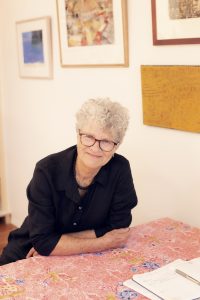When the gentle and private and highly respected author Kate Grenville marshalls a call to arms from among her author mates and colleagues about Climate Change, things are getting serious.

Not that Kate hasn’t taken note of the despairing lack of action on climate, but the feeling of helplessness and sadness as we see such a bleak and scary future for our kids and grandkids, affects us all.
Kate sent emails and in a matter of days had 80 or so of us signed up to her website writersforclimateaction.com
We writers tend to be a solitary lot most of the time, hoping prose more effective than protest. But when needs must, we speak.
Quite how we can shove a rocket up the movers and shakers is a bit unclear but getting rid of the Morrison lacklustre government was a big start.
While I’m not as erudite as the passionate Richard Franklin (he’s campaigning in Tassie over the toxic waters caused by salmon fish farms. After reading his book “Toxic” I stopped eating farmed salmon immediately).
However, I have over 29 novels made landscape the inspiration for my books. Place, primarily Australia, is always the driving character. Often in fiction one can raise issues and change minds without preaching or pontification.
I was married to a US Diplomat and lived in many countries. Yet when I did eventually return home, I realised I didn’t know, or hadn’t seen, my own country. So I knew I had to explore and write about – us.
I was also nudged by a childhood association with Australian icons, actor Chips Rafferty and poet Dorothea Mackellar. Chips told me whatever I do to: “make it bloody Australian. Tell our stories.”
I told Miss Mackeller that I didn’t have many books so I made up my own stories in my head and she seriously advised: “Then when you grow up you must put them in a book one day.”
I have done that, and as luck and timing play a big role in one’s life, my first book, set in Longreach, prompted by a campfire chat with RM Williams, did well and set me on a journey for the past thirty-three years.
Each year I am prompted by varying circumstances to journey to different places to live for a few months, soaking up the atmosphere, yarning with the locals.
To me it is the environment in which one finds oneself, that unravels the stories of place, people and landscape that dictates the lives of characters, the plot of the book.
Cities suffocate me, I yearn for space, greenness, water, and local wildlife.
But the sight of gouged wounds from mining, the nakedness of broad acre farming, the encroachment of suburbia and citification, dying rivers and mechanised feedlots, cause me physical pain.
To me, it’s all so bleedin’ obvious this is all wrong, and against nature’s way. Especially when one sees the positive results of regenerative farming, preservation of forests and wildlife, sustainable communities.
I so longed to lock the Morrison ministers in a remote community to fend for themselves. Do without the cigars and Shiraz and instead watch a sunset from the beer garden at Karumba, listen around a campfire to Narigyin elders on the Kimberley’s Mitchell Plateau, go fishing with the locals off the southern coast.
Readers want, and do, travel to these places. They send photos and emails and letters to say they look at our world through new eyes. Or tell me that they “never knew that!”
Others say they haven’t been there but after reading the book they feel they have visited or understand better, places like White Cliffs, the Daintree, the Channel Country, Longreach or Ulladulla, Broome or Heron Island.
Words are weapons.
I also publish this newspaper. I lament the cancer of treeless, soulless housing estates crammed together on what were lush dairy farms, the destruction of koala habitat, the greed of developers -bad and downright dodgy.
The Council (MidCoast) bans my paper and publicly call me unkind names and slurs. But the support by locals for this newspaper is, however, formidable. Besides how else do locals find out what’s going on?
Already it’s heart wrenching seeing the sprawl along the NSW coast of housing estates and resorts and varying “villages” – not as in quaint, caring small communities – but of glass towers and plastic lawns for retirees and the aged, whom I’m sure would rather see a tree or a bird outside their window.
‘But what can I do?’ people ask.
Raise your voice where possible. Lobby and keep tabs on your Council and local MPs. Support the likes of knitting nanas and rational business people who “get it.”
Like Kate, I ache already at what used to be as I take the grandkids around lamenting what’s gone to rolling eyes. I hear my mother’s voice lamenting loss and how it was, I hear again my grandfather talk of the wonder of the Wingham Brush.
I find myself carrying a small spider, insect or snail to safety. I notice that old men cry easily.
I don’t want to be told, you can’t stop progress. I don’t want to know about another mine opening, I’m sick of hearing lies and obfuscation from politicians.
But I feel a weight has somewhat lifted with the new government, that decent people will prevail. I don’t envy Tanya her new portfolio but feel greatly heartened she’s there and not Sussan-with-an-SS.
There are good people writing good books; historians, Indigenous writers and academics, farmers and great women on the land all over the country.
And there are some of us who “make it up” but we’ve been there. We see and hear and tell it like it is. And how it should be, in fact and fiction.
Is it too late?
When writers step outside their comfort zone like Kate Grenville, we heed the call.
Read us. Hear us. Act. There may still be time.
Di Morrissey AM
